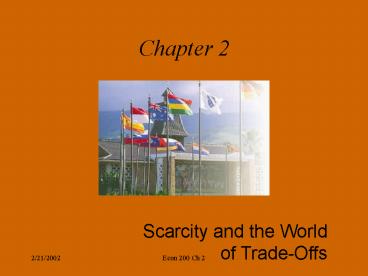Scarcity and the World - PowerPoint PPT Presentation
1 / 16
Title:
Scarcity and the World
Description:
Production possibilities, trade-offs and interpret a production possibilities ... is not the sum of all forgone opportunities, but only the next best alternative ... – PowerPoint PPT presentation
Number of Views:71
Avg rating:3.0/5.0
Title: Scarcity and the World
1
Chapter 2
Scarcity and the World of Trade-Offs
2
Chapter 2 Objectives
- Scarce resources and unlimited wants
- Differentiate among types of resources
- Opportunity cost, define and apply
- Production possibilities, trade-offs and
interpret a production possibilities curve (PPC)
on a graph. - Economic growth, opportunity costs, increasing
relative costs and unemployment of resources on
a PPC - Real-world application of production
possibilities concepts - Absolute advantage vs. Comparative advantage
3
Economic Resources
- Land
- Natural resources
- Entrepreneurial Ability Recognizes opportunity,
organizes other resources
- Capital Manufactured resources, buildings
equipment - -Labor
- Human productive
- capacity
4
Scarce Resources and Unlimited Wants
- Scarce available in only limited amounts
- Scarcity is NOT
- a shortage.
- the same thing as poverty.
- Needs vs wants
5
Scarce Resources and Unlimited Wants
- The result of scarce resources and unlimited
wants is that we cant have everything we want,
and we need to make choices
6
The Concept of Opportunity Cost
- The opportunity cost is not the sum of all
forgone opportunities, but only the next best
alternative to the one chosen - Example Joshua has 2 hrs this evening and here
are his options - Watch a movie
- Study Economics
- Work
- Write letters
- Go to the school dance
7
The concept of Opportunity Cost
- The order of Joshua preference
- Watch a movie Study Economics Work Write
letters Go to School Dance - If he chooses to watch a movie, the opportunity
cost is to study Economics
8
Production Possibilities Curve- PPC
- Depicts maximum amount of total production
possible assuming - All available resources are used at highest level
of technology available - Two goods are produced
9
Production Possibilities Curve
10
Economic Growth vs output growth
- Economic growth outward shift of a PPC
- Output growth movement from a production point
to a point farther from the origin
11
Opportunity Cost on the PPC
- Opportunity Cost is seen on a production
possibility curve as the amount of one good that
must be given up in order to produce more of the
other.
12
Why The PPC Has a Curved Shape?
- Because of the increasing opportunity costs
- Occurs when the opportunity cost of an additional
unit of a good rises as more and more of the good
is obtained.
13
Unemployment of Resources
- depicted by producing inside the PPC.
- The economy is not using all of its potential
- Idle resources
- Technical inefficiency
14
Trade-off Capital vs. Consumer Goods
Focus on capital production, more rapid growth
rate
Focus on consumer production, slower growth rate
15
Absolute Vs Comparative Advantage
- Absolute Advantage
- Ability to produce more units of a good or
service, given the quantity of inputs
16
Absolute Vs Comparative Advantage
- Comparative Advantage
- The ability to produce a good or service at a
lower opportunity cost - Relative concept
- Trading partners gain from specializing in the
production of goods for which they have a
comparative advantage and trading for other goods














![[PDF] Scarcity Brain: Fix Your Craving Mindset and Rewire Your Habits to Thrive with Enough Ipad PowerPoint PPT Presentation](https://s3.amazonaws.com/images.powershow.com/10098818.th0.jpg?_=20240814042)
















